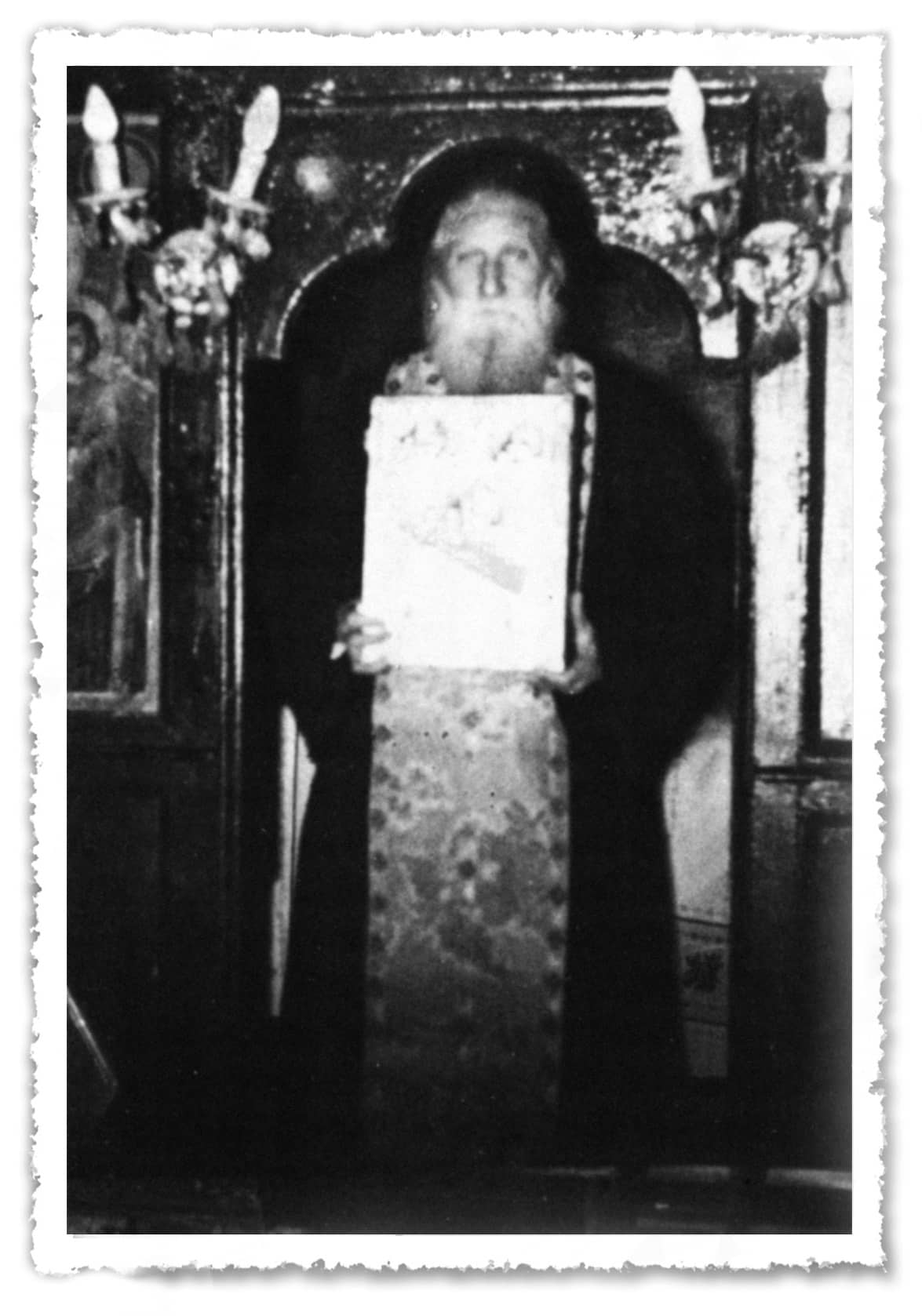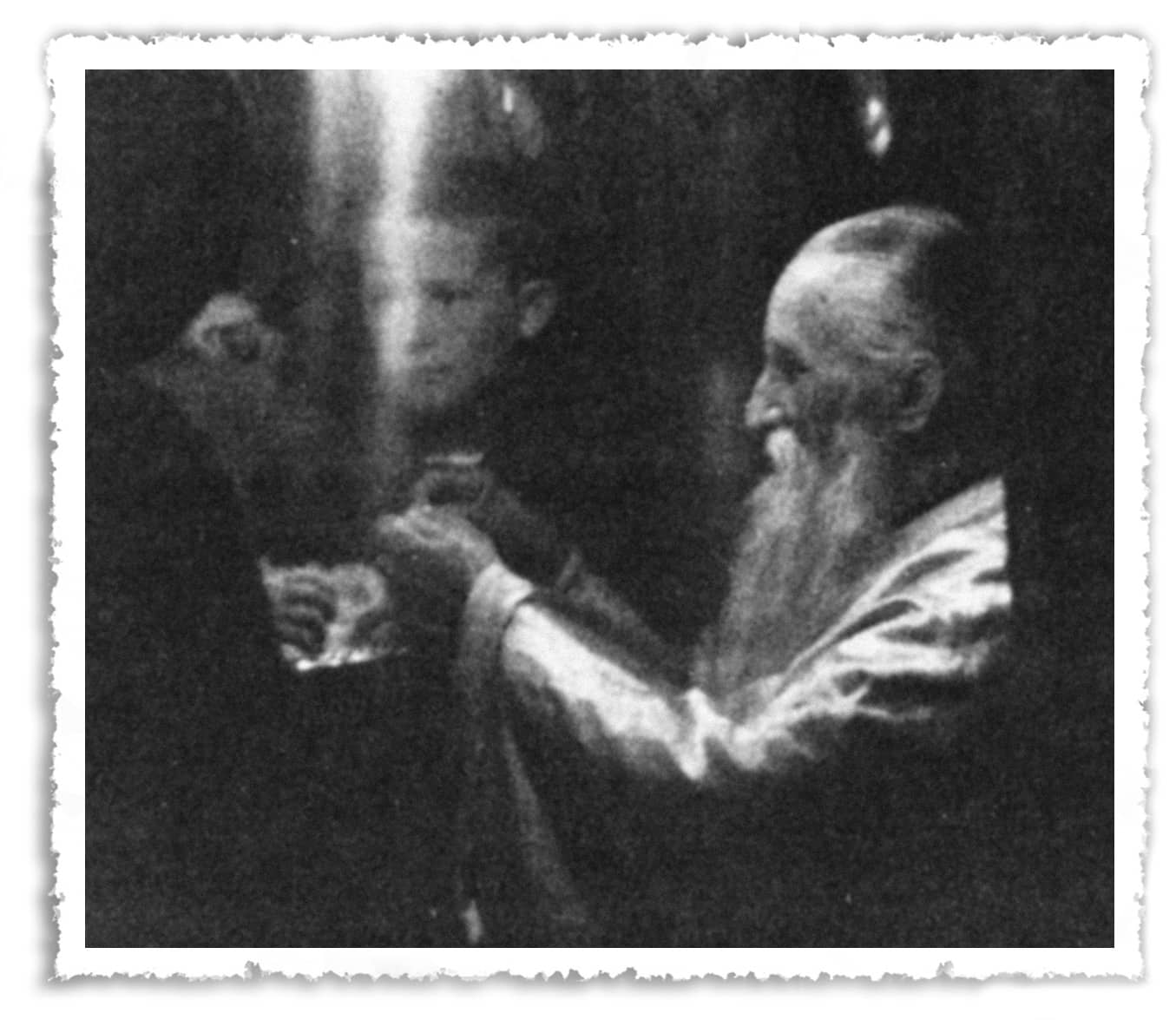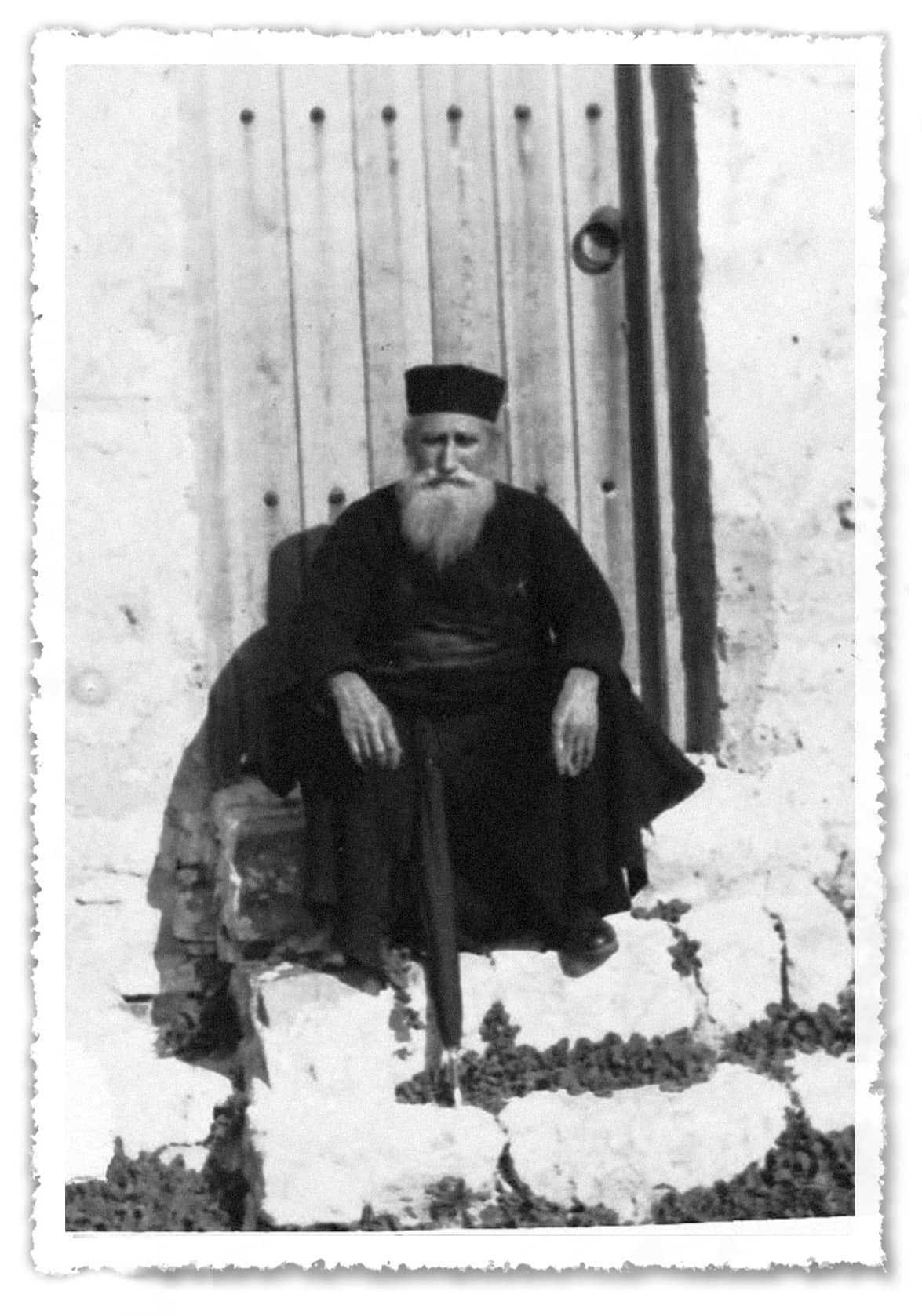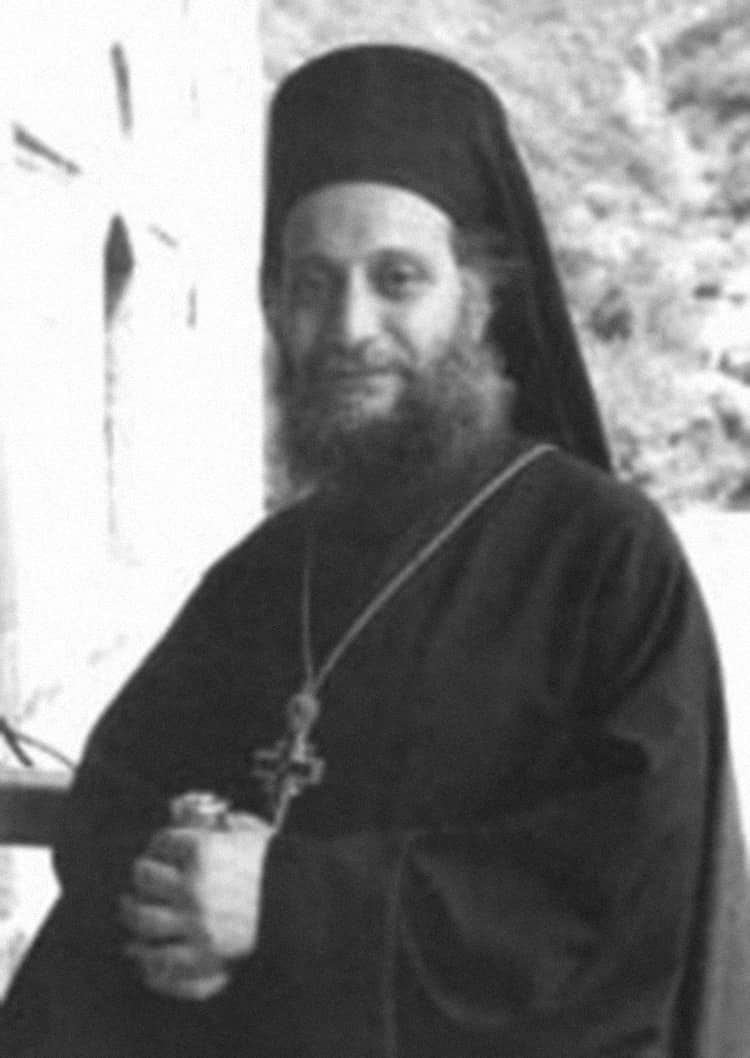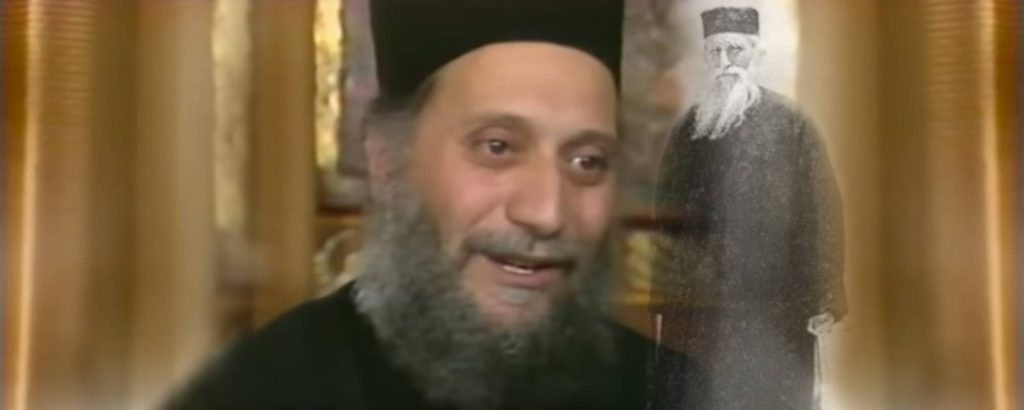
Elder Emilianos eulogizes Fr. Dimitri Gagastathis
The renowned Elder Emilianos, former Abbot of Simonos Petra Monastery on Mt. Athos, reposed in the Lord today (May 9, 2019). The text that follows is a translation of a eulogy he wrote for Fr. Dimitrios Gagastathis (+1975), a simple married priest who, he said, “walked among us but his ‘association was in the heavens’” [Philippians 3:20].
This eulogy is an excerpt from the book, Papa-Dimitri: The Man of God, a book comprised of autobiographical notes, his prayers, and testimonials.
Having been away by necessity when Heaven opened its gates to receive that blessed one who has been taken up “like an eagle’s fledgling raised in height” and now rests among the saints—Papa-Dimitri… And having not been able to venerate him, the holy priest, the prophet of the heavenly mysteries—as Saint Macarius would say—the son, the lord, the god, who had been bound down, captured, and consecrated as a sacrificial offering… Having lost the opportunity to be present among the friends and relatives of my beloved Papa-Dimitri when they interred his precious relics behind the sanctuary of the Church of the Archangels…
I am now writing down these few lines, deluding myself with the thought that I was also present at that time. In reality, however, by writing these words, I feel like I am only making a prayer-rope in front of the elder, who now rests in silence, having gathered the grace of the Holy Spirit and having given rest to God and to the whole heavenly Church.
I feel as though I am visiting again his humble house—in particular the room with the multitude of the saints’ icons—and yet once more, his fortunate flock in order to deliver one of the sermons or to hold one of the vigils that we did together—this time, however, without him. For Heaven has snatched him up, clouds have covered him, the feasting company of the Firstborn has received him. We have no doubt about it because we have lived with him and have gotten to know him personally; and this is what we saw in his life:
A Life Guided by Grace
His life flowed naturally, in simplicity and ingenuousness of heart; at the same time, though, it was a continuous journey, an ascent towards God, a constant experience of God’s revelation. Papa-Dimitri lived in a world of miracles; his life can credibly be explained only as a continuous intervention of Divine Grace.
The sure place to find him was always the Church of the Archangels—ever since he was a little child. He grew up in the half-lit church. There he would keep vigil, read the Scriptures, chant in the dim light of the oil-lamp, all the while in company with his beloved Archangels—Gabriel and Michael—his personal friends and companions. Before their old icon hanging on the iconostasis, he would recount everything, and through them accomplish everything.
When young, he was spiritually nurtured by the most pious Father Iakovos, Abbot of Metéora, a hieromonk who left a memory of virtue and holiness. The Holy Spirit must truly have found Papa-Dimitri a suitable instrument through whom to express Himself. Papa-Dimitri would often go to Metéora to meet with Father Iakovos, and after the abbot’s death, to trace his spiritual inheritance. In like manner, he would go everywhere he heard there were monastics sincerely conforming to the life of Christ.
Before committing himself to any course of action, or in deciding whether to accept a given situation, he would always consult those whom he saw being led by the Spirit. Being thus free of any self-will, he would consistently bow down before the Truth.
He would also regularly entreat his beloved Archangels, pour out his heart to the Most Holy Theotokos, and address himself to the very God, “rising early at night.” Wondrously, Heaven never remained silent. He used to say, “For whatever I want, I first put on the stole and then take up the prayer-rope.” Anxiety was foreign to his nature, as were also uncertainty, apprehension, irresolution.
He abandoned himself to God, and being thus “steered by Grace,” he walked joyfully, “picking the sheaves in gladness” [Psalm 126:6], that is, witnessing signs and miracles, experiencing divine revelations, undergoing heavenly changes. God walked in him and he walked alongside God. He sought to be in union with Him day and night—particularly under the stars at night—until such time as “Divine Grace, who dwelt in him in abundance, bolstered him entirely, strengthened him completely, and took him up from earth into the air to dwell in him forever.”
He loved God in the “fullest sense of his heart,” with “burning of spirit” and “clinging of soul.” He lived for no other reason except for “the Lord to come and dwell in him.” Using these words of Saint Macarius, we could rightly describe the meaning of his life—a life that was truly an outpouring of Divine Grace. Not only was he endowed with the gift of God’s love; he was also adorned with “a raiment of needlework” [Psalm 45:14].
When the Word finds a dwelling, when He finds a God-loving response to His knocking [Rev. 3:20]; when, in His chase, He captures the chased, He unites him with Himself; He transforms, purifies and deifies him, He makes him a divine person—a god by Grace—filled with the gifts of the Holy Spirit.
As alluded to earlier, he had the gift of constant prayer—the prayer-rope frayed away in his hand. When he used to say that he had visited us three times at night, he meant, mentally, through his prayer. In this way, he kept the whole world close to him. Should he have gone somewhere, he would always remember to take along his “prayer kit.” Eventually, when he became bedridden and could no longer go physically to his beloved church to carry out his schedule of services—one of which was the reading of countless names of the living and the dead for commemoration—he started the practice of mentally visiting, first, his home village of Plátanos, followed by Tríkala, and then “every city and town,” commemorating the names of everyone he knew along the way. At night, in the first hour after midnight, he used to knock the handle of a small, nearby dresser with his hand in order to have Presbytera wake up and begin eliciting “Lord have mercy” responses to his entreaties and commemorations.
He also had the gift—bestowed by God—of tears. Almost always, during Liturgy and in his prayers, his countenance would be filled with tears. When celebrating Divine Liturgy before God, “co-serving with the saints,” his disposition was entirely simple, while at the same time, fully uplifted and “many-eyed” [Ezekiel 10:12].
Despite all these acquired virtues, he nevertheless held himself as “unworthy, and the least of all,” his humility being most true. “Do not entreat God for me,” he used to say, “I do not deserve it.” “While I am here, I bring loss to the Church and the people. I, the unworthy servant that I am, cannot bear any fruit. I can only weep for my sins and entreat God for the whole world.”
Everyone who knew him was amazed at the depth of his love and concern for his spiritual children. His patience even horrified the demons.
His days passed in places filled with sweet church fragrances—the delicate scents being diffused also to others at times. He lived in a world susceptible to heavenly miracles. “Tonight, I want a miracle,” he was able to boldly say to his saints. “Where else can I go? I can go nowhere else.” At other times, he would ask them: “Why do you stand by idle? Give also a helping hand!” How could the saints not answer him? How could God turn a deaf ear? He surely hearkened “as He willed and as it was good.”
Let us not expound more upon his gifts, except to add that he was a friend of the Theotokos—he loved her deeply, as did all the saints—and that he possessed the virtue of discretion along with the beauty of a purified soul. Endowed with a blessed ending, he was most assuredly taken up to be with the Beloved, having been made into a vessel of Divine Grace, shaped masterly by the Spirit.
A Life Steeped in Pain and Passion for God
He felt the desire to become an apostle of Divine Grace—a co-worker [1 Corinthians 3:9] in salvation, a mouthpiece [Acts 3:18] of God—when still young. A flame of missionary zeal consumed him, but fear and a lack of education initially held him back. At first, when the Lord’s voice reverberated the question “Whom shall I send?” [Isaiah 6:8] within him, his foremost thought, alas, was: “Behold, I do not know how to speak” [Exodus 4:10]. God nevertheless taught him “what he should suffer for His name’s sake” [Acts 9:16].
He was allured, and once he felt God’s power, he did not cease to recount all the sufferings he should endure for God’s sake. Whatever happened to him afterward, he regarded it as a means and a cause of salvation, both for himself and for others. He, therefore, wanted to have everything brought forth and revealed, either confidentially within private conversations or publicly “from the housetops” [Matthew 10:27], “in the great church congregation” [Psalm 22:25]. Without realizing it, he had begun to follow the apostolic way. For this reason, it was no longer possible for him to live in peace, but only under conditions of misunderstanding, persecution, abandonment, and pain.
The first source of pain for him was the realization—through his illumined and sensitive heart—of the vanity of the world: a world held captive to the law of death and decay, cast away in a state of exile from God. He deeply felt the reality of separation from the One for Whom he should be longing and to Whom he should be constantly crying out with a loud voice.
Simple-hearted and uneducated as he might have been, Papa-Dimitri possessed a divine zeal which taught him “to suffer, and by suffering to recall the glory and freedom of which he had fallen away and which he exchanged for slavery.” Certainly, he must never have read these words but by means of his own words and manner of expression, he would say: “I shout. I shout. Will He not at some time listen to me?” … “You must shout ‘Lord, have mercy’ so that it may reach the ears and strike the heart. … Then contrition comes; tears flow from your eyes. … Then Christ comes, and you feel peace and sweetness within you.”
Every time this saint prayed to God for forgiveness, his whole being quivered mightily. Soaked in tears and sweat, he begged for God’s grace with shouts. “No work, no pay,” he used to say. This daily struggle of Papa-Dimitri ended with an afterglow of salvation as well as with glorification of God and boldness toward Him.
A whole heaven stirred and was illumined within him—its brightness being able to touch others, too. Those who witnessed this for themselves were observing a heavenly sight which concealed his pure and childlike soul. The confessor who would hear his confession would be impressed to think that he had the greatest sinner in front of him. But soon a shiver would overtake him and he would, unwittingly, experience something of the awe that Forerunner John must have experienced when he placed his hand on Christ’s head.
Another source of pain for Papa-Dimitri was the love he had for his flock. He was in a constant state of travail with regard to his spiritual children, taking each of their burdens upon himself and weighing them heavily on his mind. Throughout his entire life, this humble priest served them as a witness to the truth of the Gospel, his life’s example becoming itself an evangelical epistle. He became a God-taught writer [Psalms 45:1] of the Heavenly Kingdom, a teacher of the things he himself experienced and endured, an intercessor who “denied himself every hour and suffered many afflictions,” a pastor who prayed “duly, painstakingly, and intensely” for the people of God.
He served Liturgy continuously for his flock, standing as another Habbakuk at his watch [Hab 2:1] and being transformed according to the cherubic chariot of Ezekiel. Many times he served Liturgy for forty consecutive days. He also would read for hours daily his “list of names,” and through such commemoration, would bring his spiritual children into the heavenly sanctuary with him and stir them to kneel inwardly before the hem of the garment [Matthew 9:18-20] of God. How much labor, how many tears, how much pain!
He could suffer no less, of course, to bring peace to the disturbed hearts of the faithful, resolve their differences, protect the poor and the orphans, rectify every injustice. He was the one to run to everyone’s need; he was responsible for all. “Make haste, Papa-Dimitri, run!” he would say to himself, “The Devil has once more encompassed the village!” Whereupon he would grab his stick and not come back until he had met with victory.
How could he find time to sleep? When could he get a chance to rest? He served as the accountable “ruler” [Luke 12:42] of his house, of the village, of the people’s souls, of literally everything under his purview. He was “offered up” [Philippians 2:17] for others.
For any problem that arose, he held that it was he who was ultimately to blame. In his humility, he always considered himself “a sinner,” and so, in the final analysis, it was his personal shortcomings which rendered him responsible. While on the run to settle one matter, he would simultaneously be occupied with another. At times, he would be rebuking himself for not remembering everyone’s name in his commemoration prayers. Whenever he could not recall someone’s name, he would instead murmur out their occupation: “For the president of the community bus service, for the doctor, for the nurse, for the …”
In this way, he would cast everyone before God’s forbearance and, in so doing, help to lift everyone’s burden. His pattern of service reveals not only the intensity of his prayer but also an incessant emptying and melting away of self, pouring out of soul, a “burning care” for everyone—“the daily pressure of care for all the churches” [2 Corinthians 11:28].
Shall we recount as the cause of a thousand martyrdoms the numerous persecutions he suffered and endured? His never-ending afflictions are legendary as are also the animosity and manner of death he endured at the hands of the enemies of the faith, both known and unknown. It was as if the powers of hell had broken loose against him, expressly because he was a faithful steward and apostle of God. Even the priestly hands of fellow clergymen were dishonored in attempts to take his life.
There is no need to dwell on his obvious source of pain, that is, his great many illnesses; or the patience he exhibited— like another Job—when, in his last days, there was no longer “any healing in his flesh” [Psalm 38:4], when it had all turned into one encompassing wound. As things were, it was necessary for him to become equal to the saints in all respects [Hebrews 2:17]—that he come to lack in nothing. His body’s weakness served to strengthen his soul and reveal the power of God [2 Corinthians 12:9]. Indeed, he could only suffer—it was not possible for his life to progress otherwise. He was in pain for the purification of his heart and for the acquisition of God. This constituted the cornerstone of his whole spiritual edifice. Behold, he was “in travail” and “bore a spirit of salvation.”
An Enigmatic Life, a “Strange Mystery”
On the surface, the life and teachings of Papa-Dimitri are plain and simple. He was kind, pleasant, considerate—a meek and delicate man with a sensitive soul, a careful thought, and an affable word. He was easily filled with enthusiasm and expressed his joy candidly. His customary speaking with good humor and by many illustrations created a comfortable and pleasant atmosphere for all those around him.
He sought to please everyone, taking care to neither expose anyone nor put him on the spot. He avoided passing judgment on others and instead tried to justify people for their acts, or simply kept them in confidence. He liked to participate in the discussion only when the topic was not about earthly vanities. His words and manner of expression revealed—as if through a painting—the beauty of his soul. After conversing with him, partakers would leave transformed, filled with thoughts stirring their innermost parts, and burned up by the fire that God, through him, lit within their souls. Papa-Dimitri was a compelling “man-maker.” Nevertheless, his actual life, concealed “in God through Jesus Christ” [Romans 6:11], was hidden from the eyes of men, uncaptured by the tentacles of their earthly reasonings and judgments. Were he not the tangible object of their accusations, he would at least be looked upon with prevailing uncertainty or be considered naïve if not judged an outright egotist. To “spiritual” people, he was a subject of scandal; to a great many, a fool.
But were he not a subject of scandal, had he not lived as a fool for Christ, he would not have been a true man of God—he would have been simply a figure acceptable to psycho-spiritual people. His life can be described only as a “strange mystery,” a living mystery. He walked among us but his “association was in the heavens” [Philippians 3:20]. He was living “as though in another world.” The depth of his soul was well concealed from the eyes of the casual observer.
It could not have been otherwise, of course, as Papa- Dimitri proved to be unqualified to assimilate the spirit of this world. Thinking with “the mind of Christ” [1 Corinthians 2:16], he bore another kind of spirit, a different kind of mentality. Consequently, to the worldly wise, he was incomprehensible. By what earthly criterion can men explain, for example, the ease by which Papa-Dimitri used to talk about himself, mention praises attributed to him, or reveal personal experiences such as the leaps and ascents of his heart? How can they discern the fire which inflamed his soul and made it irrepressible and “imprudent”?
After having listened to Papa-Dimitri talk knowingly about Satan, how could earthly-minded men not be skeptical? Being familiar—at most—with only the passions and afflictions of their own lives, how could they possibly understand what the struggle against the “spirits of evil” [Ephesians 6:12] is really about? The “humble little priest,” however, directly experienced the envy and roaring of the ravenous mental lion [1 Peter 5:8], who, as he disclosed, tempted him with “Saint Anthony’s temptations.” Satan touched upon him [Job 1:11], pressed him and exhorted him to sin, but the humility of the “little priest” dissolved his designs.
Moreover, Papa-Dimitri, while in the midst of people who totter and “change forms in this age” [Romans 12:2], remained steadfast and “uncompromised,” an unswerving man of integrity. To illustrate, while being persecuted by communists— enemies of the Church and the nation during the Greek Civil War—he could have chosen to negotiate the difficult turn of events with a little “cleverness,” knowing that conditions would eventually return back to normal. He chose not to compromise the dictates of his conscience, however, which forced him into a life of hardship, taking refuge at night in the “caves and holes of the earth” [Hebrews 11:38], kneeling down on the damp soil with his hands raised up towards God, asking Him to be his witness and helper. His “friends and kinsmen” [Psalm 38:11] meanwhile shouted for him to “come to his senses.”
Papa-Dimitri held fast to the same uncompromising and resolute guiding principle in all ecclesiastical matters, including problems concerning secularization trends within his flock. It must be stressed though, that his strictness was always coupled with abundant love. As a true priest, he was closely knit to the people, full of love for his fellow man, abundantly merciful, warmly openhearted and sociable. He could always be seen with candies-in-hand for the little children and money-in-hand for the needy. He was even concerned over the village’s public resources such as conference rooms and the library. He paid the people comforting visits, made them goodwill gifts, sent them helpful letters.
Let no one be misled, however, to believe that he was present only to organize, to be active, or to be social. While it is true that he was involved in every facet of the village, in reality, he lived outside of it all—in the peace and security of heaven—empowered by his own mystical life experience. Although married and the father of many children, he lived his life as an ascetic does—in the company of his Lord and God. He was a struggler “dwelling faraway from the beauties of life,” “dwelling within his own heart,” “dwelling in God.” In this world, he possessed nothing but virtues—virtues of the saints and virtues of contemporaries whom he held in admiration— which he painstakingly “gathered up.”
Nowhere would he find rest. He would reveal his emigration from the world and his association [Philippians 3:20] “with all the saints” by running from monastery to monastery and from shrine to shrine. He truly lived together with God, Who spoke to him as he did with all the saints: “through dreams in the night and through the intellect in the day.”
He lived in concert with his beloved Archangels; he associated most comfortably, naturally and “perceptibly” with the saints. The Archangels, as a matter of fact, had much to do with Papa-Dimitri getting married. He once asked Saint Nicholas for his blessing—special permission—to allow him to scatter a disorderly crowd with his stick. Another time, he firmly demanded of Saint George that he revive a dried-up fountain. On another occasion, after being persecuted by enemies, and having prayed to Saint George for deliverance—miraculously— he crossed a swollen stream “with dry feet” exclaiming with unprecedented boldness and simplicity: “Heh! We just got hold of George! We got him—the great benefactor!”
He also greatly venerated Saint Nektarios—he would never fail to read his Salutations. He was especially close to the Mother of God: there is no place he would go without her—he would set out, “sojourn” together, and then return home with her.
Be it the sleep of his body, the watchfulness of his soul, the mystery of his eyes, his speech, his silence—everything was a means of communication with God and with the friends of God. He lived this life in union with the mystical body of the Church and the Kingdom of God, “contemplating the visible, understanding the invisible.”
He had, moreover, taken care to fill every place in and around the village with signs and images of that Kingdom. When he would take visitors around the village to show and explain to them the icons, crosses and other such things as he had erected, the visitors could not help but be impressed to think that some prophet or other biblical figure had been raised from the dead and was now standing right before their eyes.
Someone once timidly said to him: “Papa-Dimitri, you filled our village with churches and crosses—shall we turn it into a monastery?” But Papa-Dimitri knew well what he was leaving behind: “A column to the God of Jacob.” Should those assimilated to this world understand everything? If so, there would be no mystery about the Kingdom of God and not one soul would be “not of this world” [John 8:23]. The words “having received life here in provision and moving toward the future” would be meaningless and that which was taking place in him commonplace. Quite the opposite, Papa- Dimitri saw and evaluated everything from the perspective of eternity.
A “Column Inscription”
There are certain psalms of David that bear the title “Column Inscription.” These psalms were originally intended to be inscribed in columns in order to remind the Israelite people of the specific miracles of God. Above all, the intention was that the psalms would become inscribed deeply in the hearts of the people as a means to foster continuous praise to God.
In our own time also, God has left us one such “Column Inscription”: It is the ground where Papa-Dimitri rests and awaits the sound of the trumpets [Matthew 24:31]. That hallowed ground truly constitutes a hymn of praise to our God, because it covers a saint.
During the procession at the burial of his precious relics, some people exclaimed: “He is like Saint Nektarios!” He is indeed like Saint Nektarios, but not like him only. He is, in truth, like all the saints! “When I find a place there,” he used to say, “I will come and help you. I cannot possibly forget my spiritual children!”
In his last days, amid unbearable suffering, he sought to remain still, composed, his thoughts immersed in and delivered up to God. When visitors came, they thought he was sleeping and would nudge him physically in order to wake him. How crestfallen he would then be! He would later explain to some persons in confidence: “What things, what hymns were these! … Somewhat like what I had once heard, but infinitely superior. Superb ones!”
Oh, Papa-Dimitri! You stared into the beyond then… look back towards here now and listen to what the scripture says: “Mine is Gilead, mine is Manasseh” [Psalm 108:8]. You are His. Hasten so that we may also become His. Do you remember? That dawn, at the doxastikon of the Praises, when you took your co-celebrant’s hand and directed the chanters to chant—in place of the Theotokion—the doxastikon of the saint whose commemoration day had already passed? Let your commemoration day pass now also. The doxastikon is chanted by the angels. It is also chanted by our hearts.
Abbot Emilianos (Vafidis)
Holy Monastery of Simonos Petras
Mount Athos, February 26, 1975
The voice of Papa-Dimitri
